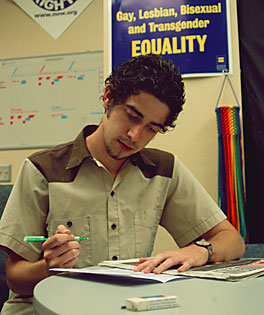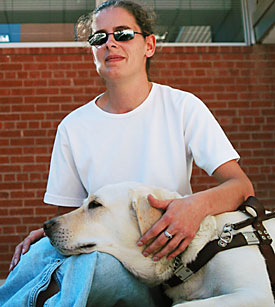 |
|
|
"I was tired of talking and reading about gender and queer rights and not participating in them. I knew that it would force me to face my fears about how I might be perceived." Joey McMurdie
chemical engineering junior
|
|
By Lindsay Walker
Arizona Daily Wildcat
Tuesday September 24, 2002
Students put aside stereotypes and standards to explore worlds different from their own. When it comes to religion, gender roles or sexual orientation, learn to ...
Imagine you're a guy. A nice guy. You're talking to a girl, flirting even, when she bats her eyelashes and asks you what you are doing in the Student Government office. You point to the rainbow flag across the way, and suddenly, her teasing body stiffens.
She automatically thinks you're gay, even though you're not. This may sound like a harsh movie scene that makes us cringe when we witness the awkward silence and uncomfortable grimaces of those involved, but it's not.
It's happened to Joey McMurdie.
But he isn't the only UA student faced with these assumptions. They happen more often than people would think, especially to students whose areas of study appear to be the opposite of what they stand for.
McMurdie, a chemical engineering junior, is a straight member of the Associated Students of the University of Arizona Pride Alliance.
Pride Alliance is a resource center that focuses on supporting social activism and eradicating myths and stereotypes associated with sexual and gender diversity.
McMurdie originally joined Pride Alliance because his father is homosexual.
"I was tired of talking and reading about gender and queer rights and not participating in them," he said. "I knew that it would force me to face my fears about how I might be perceived."
McMurdie says that most members of the organization do not treat him any differently than others because he is straight.
"The truth is that the GLBTQ (gay, lesbian, bisexual, transgender, queer) community has to deal with straight people every hour of every day," he said. "I'm the one in the new situation."
Of course, a great deal of the time, those within Pride Alliance do not know who is straight and who is not because the group does not force its members to reveal their orientation. The members are allowed to define themselves as they wish.
Jonna Lopez, the director of Pride Alliance, said that the "out" straight members in the group are treated well and their efforts are just as appreciated as those of queer members.
"It can be very powerful to make a show of allies in the straight community," she said. "Once straight people learn that homophobia and ignorance hurts them too, then a big step toward eliminating them (homophobia and ignorance) will be completed."
But, no matter how accepting people within Pride Alliance might be, those outside Pride Alliance do treat McMurdie differently when they discover that he is a member.
"Some people are like, ÎWhy?'" he said. "Some are dumbfounded. Some think it is stupid, some think that it's great, but they wouldn't do it."
"Strangers tend to assume that I'm gay when they learn that I am a member of Pride Alliance. It's something that I've grown to accept and feel comfortable with. There's a certain freedom in realizing that it doesn't matter."
According to McMurdie, assumptions are made because people don't know his situation or the situations of others, and often don't care to find out.
A ssumptions are what lead people to ask David Rubin if he "meets a lot of chicks" because of his major.
Rubin is a graduate student in women's studies.
He first became interested in women's studies during his undergraduate work at the University of Washington. He was disappointed with his pre-major classes and longed for some stimulation and freedom from what he viewed as the assumption that students should just sit back and be given information without having to think for themselves.
He desired more critical thinking and analysis than he was being "fed." He decided to enroll in a few women's studies classes and was shocked at the stark contrast he discovered between these courses and those he had previously taken.
"Women's studies provided me with a space in which to ask questions about why society takes the shapes it does," he said. "About how our identities have been historically produced, and about how relations of inequality and power are constitutive of our everyday lives."
Rubin plans to use his degree to become an activist-scholar of sorts, or possibly a professor of women's studies, queer studies, intellectual history, or cultural studies.
And according to Julia BalŽn, the advisor for women's studies, a surprising and growing numbers of males like Rubin are also on a quest for a challenge from the women's studies department.
"The percentages of men (in women's studies) have slowly inched up (from) a couple of years ago," she said. "The number of male faculty doing women's studies-related work has also increased."
Rubin has discovered that only a minority of people within the women's studies department has the notion that men can have nothing to do with feminism. In fact, most in the department seem to realize that Rubin also has a role in feminist studies.
"Women's studies is first of all a critique of masculinist power," Rubin said. "But second of all, women's studies is a critical questioning of how identity formations work to produce, maintain and challenge unequal social relations."
Rubin strongly feels that people should know what is going on in the world around them and that assumptions are hazardous to the individual making them.
"If people don't know what women's studies is or why a male might want a master's degree in it, and if they are genuinely interested in the question, then they ought to think critically about their own assumptions about men and feminism before making some dumb joke to me at a party," he said.
People can also question a student's religious affiliation because of their major.
 |
|
|
"The more I learn, the more I learn that neither side is right, and both sides have to work to make it work." Hannah Goodman (Pictured with Penelope, her seeing-eye dog)
Judaic studies and Near Eastern studies major
|
|
When Hannah Goodman, a Judaic studies and Near Eastern studies double major senior, studied abroad in Israel two years ago, her Jewish friends asked her why she had not fasted for Yom Kippur.
Goodman isn't Jewish. In fact, she is a devout Christian.
Goodman first decided to double major in Judaic studies and Near Eastern studies because she is very interested in the Middle East. She is taking the classes not so much for the religious education but for the modern and political connotations involved.
Those in her church do not scorn her for studying something other than Christianity. In fact, they often ask her about current Israeli issues. Also, professors in many of her classes often turn to Goodman for a Christian perspective in the middle of discussions.
Goodman finds that studying other religions and seeing many Biblical sites in Israel have actually strengthened her beliefs.
"It is very nice, especially after going to live in Israel, because my Christianity came alive," she said. "I have a historical perspective and a modern history perspective."
She has never considered converting to either Judaism or Islam. But Goodman is passionate about the current happenings in the Middle East.
"When bombs go off in Israel, I am very upset," she said. "I know I can do something about it, either directly or indirectly."
Goodman aims to work for the U.S. government one day.
"I should be able to protect my country," she said.
But why would anyone double major in two seemingly conflicting areas? Goodman finds her answer to be the key to her success.
"If I only took Judaic studies, I would only get one side," she said. "The more I learn, the more I learn that neither side is right, and both sides have to work to make it work."
Goodman, Rubin and McMurdie's experiences have made many people make some very wrong assumptions about them.
But for Goodman, it is worth it. "It is nice to have a broader perspective."
And for Rubin, it is worth it. "It is essential to commit oneself to changing the world."
For McMurdie, it is worth it. "It adds to me as a person."
After all, there's a certain freedom in knowing that some things just don't matter.
Jessica Suarez contributed to this report.

